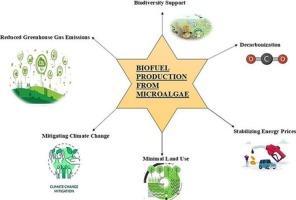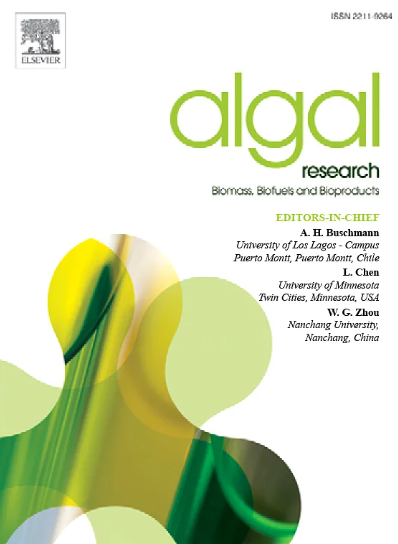探索利用藻类作为生物燃料生产的生物质原料的效率和可扩展性
IF 4.5
2区 生物学
Q1 BIOTECHNOLOGY & APPLIED MICROBIOLOGY
Algal Research-Biomass Biofuels and Bioproducts
Pub Date : 2025-08-01
DOI:10.1016/j.algal.2025.104251
引用次数: 0
摘要
可持续发展对于为子孙后代保护基本资源至关重要。化石燃料的广泛使用产生了严重的污染,通过酸雨等现象严重影响了陆地和水生生态系统。尽管藻类生长迅速,光合效率高,并且能够在各种条件下茁壮成长,但藻类已成为生物燃料生产的可行替代生物质原料。本文综述了藻类生物燃料的效率和可扩展性,重点介绍了生物质产量、脂质含量和转化技术等关键因素。与传统的生物燃料原料如玉米或大豆相比,藻类具有更高的脂质产量,使其成为大规模燃料生产的有吸引力的选择。然而,有几个障碍阻碍了藻类生物燃料的广泛采用,包括高生产成本、能源密集型种植和水消耗。本文还考察了各种养殖技术的效率和适用性,包括露天池塘和光生物反应器,以大规模生产。通过将碳捕获技术和废水处理相结合,藻类生物燃料的生产在经济上更加可行,在环境上更加可持续。基因工程和代谢优化的进展进一步提高了脂质生产力,为大规模应用提供了广阔的前景。本文还对旨在提高生物燃料产量的基因工程技术进行了分析。该研究强调了以藻类为基础的生物燃料作为传统化石燃料的环保替代品的潜力,强调了这些创新方法。虽然评估承认基于藻类的生物燃料可以减少对化石燃料的依赖并有助于减缓气候变化,但它也指出,为了克服当前的财政和技术挑战,有必要进一步研究和开发。本文综述了藻类栽培、收获技术和生物燃料提取工艺的最新进展。其目标是全面了解藻类作为生物燃料生产的可持续和有效原料的现状,以及未来的前景。本文章由计算机程序翻译,如有差异,请以英文原文为准。

Exploring the efficiency and scalability of using algae as a biomass feedstock for biofuel production
Sustainability is paramount to preserving essential resources for future generations. The widespread use of fossil fuels generates significant pollution, severely impacting both terrestrial and aquatic ecosystems through phenomena such as acid rain. Despite their rapid growth, high photosynthetic efficiency, and ability to thrive in a variety of conditions, algae have become a viable alternative biomass feedstock for biofuel production. This review explores the efficiency and scalability of algae-based biofuels, focusing on key factors such as biomass yield, lipid content, and conversion technologies. Algae have a higher lipid yield compared to traditional biofuel feedstocks such as corn or soybeans, making them an attractive option for large-scale fuel production. However, several obstacles hinder the widespread adoption of algae-based biofuels, including high production costs, energy-intensive cultivation, and water consumption. This paper also examines the efficiency and suitability of various cultivation technologies, including open ponds and photobioreactors, for large-scale production. Algal biofuel production could become more economically viable and environmentally sustainable through the integration of carbon capture technology and wastewater treatment. Advances in genetic engineering and metabolic optimization are further increasing lipid productivity, offering promising prospects for large-scale applications. This review additionally provides an analysis of genetic engineering techniques aimed at increasing biofuel yields. The study emphasizes the potential of algae-based biofuels to serve as environmentally friendly alternatives to traditional fossil fuels, highlighting these innovative approaches. While the evaluation acknowledges that algae-based biofuels can reduce dependency on fossil fuels and help mitigate climate change, it also notes that further research and development are necessary to overcome current financial and technological challenges. This review explores the recent advancements in algae cultivation, harvesting techniques, and biofuel extraction processes. Its goal is to present a comprehensive understanding of the current state of algae as a sustainable and effective feedstock for biofuel production, along with future prospects.
求助全文
通过发布文献求助,成功后即可免费获取论文全文。
去求助
来源期刊

Algal Research-Biomass Biofuels and Bioproducts
BIOTECHNOLOGY & APPLIED MICROBIOLOGY-
CiteScore
9.40
自引率
7.80%
发文量
332
期刊介绍:
Algal Research is an international phycology journal covering all areas of emerging technologies in algae biology, biomass production, cultivation, harvesting, extraction, bioproducts, biorefinery, engineering, and econometrics. Algae is defined to include cyanobacteria, microalgae, and protists and symbionts of interest in biotechnology. The journal publishes original research and reviews for the following scope: algal biology, including but not exclusive to: phylogeny, biodiversity, molecular traits, metabolic regulation, and genetic engineering, algal cultivation, e.g. phototrophic systems, heterotrophic systems, and mixotrophic systems, algal harvesting and extraction systems, biotechnology to convert algal biomass and components into biofuels and bioproducts, e.g., nutraceuticals, pharmaceuticals, animal feed, plastics, etc. algal products and their economic assessment
 求助内容:
求助内容: 应助结果提醒方式:
应助结果提醒方式:


